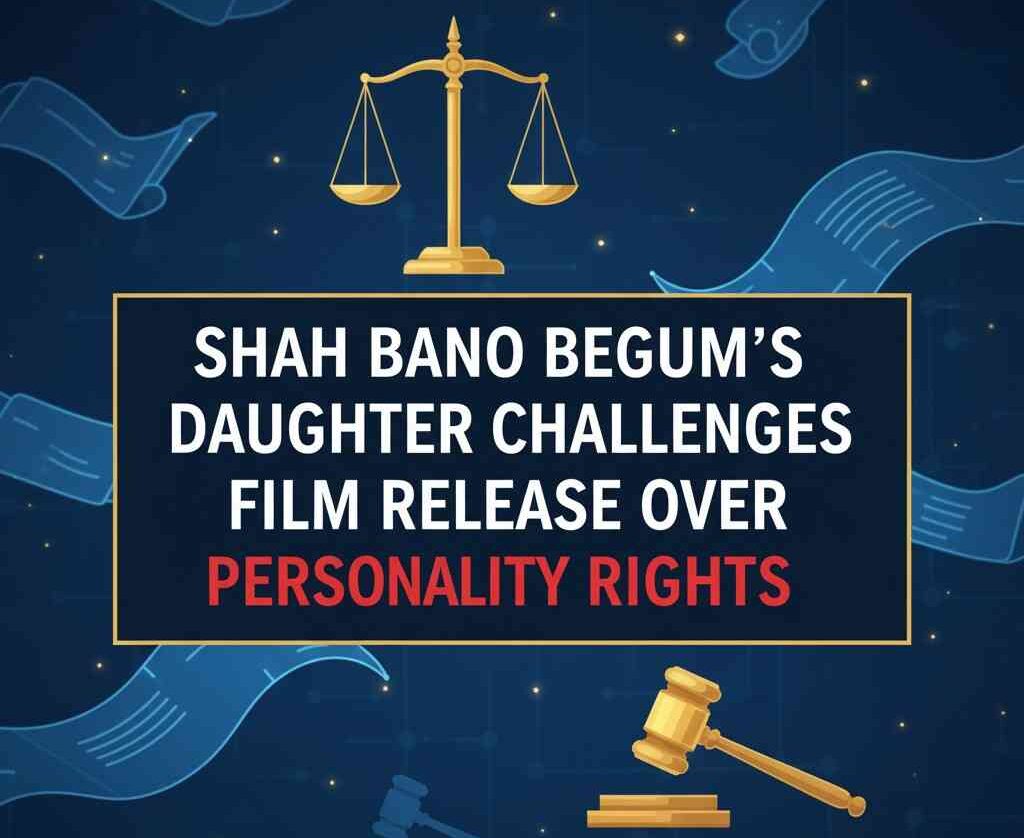The daughter of Shah Bano Begum has filed a petition in the Madhya Pradesh High Court to stop the release of a film inspired by her mother’s life. She alleges the movie misrepresents facts and violates personality and privacy rights. Learn more about the case, its legal implications, and what it means for biographical films in India.
Introduction
A new controversy has emerged in the Indian film industry as the daughter of Shah Bano Begum, a name synonymous with one of India’s most landmark legal cases, has approached the Madhya Pradesh High Court. She has sought to halt the release of a film allegedly inspired by her mother’s life, claiming that the filmmakers neither sought her family’s consent nor portrayed Shah Bano’s story accurately. The case raises critical questions about personality rights, privacy, and freedom of expression in India’s creative industries.
Background: Who Was Shah Bano Begum?
Shah Bano Begum was at the center of a historic 1985 Supreme Court judgment that reshaped the discourse on women’s rights, maintenance, and secular law in India. Her petition against her husband, seeking alimony under Section 125 of the Criminal Procedure Code, led to a landmark verdict affirming Muslim women’s right to maintenance even after divorce. However, the judgment triggered political and religious controversy, culminating in the enactment of the Muslim Women (Protection of Rights on Divorce) Act, 1986.
Given the socio-political impact of her case, Shah Bano’s story has been discussed in books, media, and academia for decades. Now, its cinematic adaptation has reignited the debate over how far filmmakers can go in depicting real-life events without consent from the people involved or their families.
The Petition: Allegations and Legal Grounds
The petitioner, Shah Bano’s daughter, claims that the upcoming film—whose title and production details have not yet been publicly confirmed—uses her mother’s life as its central theme. She argues that:
- No consent was sought from Shah Bano’s legal heirs for using her story or likeness.
- The film misrepresents facts related to her mother’s life, personal struggles, and the legal battle that made her a public figure.
- The filmmakers’ actions violate personality rights and the right to privacy, protected under Article 21 of the Indian Constitution.
Her petition urges the High Court to stay the film’s release until the matter is properly examined, citing possible irreparable harm to her family’s reputation and emotional well-being if the film is released in its current form.
Legal Issues at the Heart of the Case
This case brings several important legal principles into focus:
- Personality Rights and Privacy:
Personality rights safeguard an individual’s image, name, voice, and likeness from being used without authorization. While these rights are often associated with celebrities, they can extend to anyone whose life story is exploited for commercial purposes. - Freedom of Expression vs. Right to Privacy:
The filmmakers may argue that the film is a creative interpretation inspired by true events and protected under Article 19(1)(a) of the Constitution (freedom of speech and expression). The court will need to balance this with the petitioner’s right to privacy and dignity. - Defamation and Misrepresentation:
If the movie portrays Shah Bano or her family in a negative or distorted manner, it could amount to defamation. Courts often scrutinize whether filmmakers have exercised due diligence in depicting real-life individuals.
Precedents and Similar Cases
Several past cases in India have set the tone for such disputes.
- In Phoolan Devi v. Shekhar Kapur, the Bandit Queen challenged the portrayal of her life story in the film Bandit Queen, arguing that it was a misrepresentation and a violation of her privacy.
- In Anil Kapoor vs. Unknown, the actor sought to protect his image and likeness from unauthorized use.
- More recently, films and series inspired by real events—such as Scam 1992 and The Kashmir Files—have faced scrutiny over factual accuracy and consent issues.
These precedents show a growing tension between creative freedom and individual rights in India’s film industry.
Possible Outcomes
The Madhya Pradesh High Court’s decision will likely hinge on whether the film is a fictionalized work “inspired by” real events or a direct biographical portrayal of Shah Bano Begum.
- If the court finds strong parallels between the movie and Shah Bano’s real story, it may direct the producers to seek consent or alter certain elements.
- Conversely, if the film is deemed a broadly inspired narrative with fictionalized characters, it could enjoy constitutional protection under freedom of expression.
Conclusion
The petition by Shah Bano Begum’s daughter underscores the growing importance of ethical storytelling in cinema, especially when dealing with real people and sensitive historical events. As the court deliberates, this case may set new benchmarks for how filmmakers handle biographies and true stories—balancing the right to creative freedom with the moral and legal duty to respect individual dignity and consent.
Frequently Asked Questions (FAQ)
What are personality rights?
Personality rights refer to an individual’s right to control the commercial use of their name, image, likeness, or life story. These rights prevent others from exploiting a person’s identity without authorization.
Can a filmmaker make a movie about a real person without consent?
Filmmakers can create works inspired by true events, but if the portrayal identifies real individuals, they must obtain consent or use disclaimers to avoid defamation and privacy violations.
Why is the Shah Bano case important in Indian law?
The 1985 Shah Bano judgment recognized Muslim women’s right to maintenance after divorce, marking a significant step toward gender equality and secular justice in India.

























